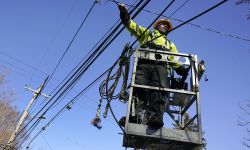Michigan child labor abuses spur fines, push for reforms

LANSING — In the year since a scathing report exposed child labor in a Michigan factory, legislators and regulatory agencies have taken steps to combat the complex problem.
In February 2023, the New York Times published the first installment of an investigative series exposing widespread child labor across the U.S. manufacturing industry. The report focused heavily on a Hearthside Food Solutions plant in Kentwood, which the newspaper described as “full of underage workers.”
Subsequent actions have included state workplace safety fines, state and federal child labor investigations, and pending bills to strengthen penalties for employers, protect whistleblowers, and create a statewide database of underage workers.
Related:
- Democrats are back in power in Lansing. Their wish list is slim
- Democrats ditching Whitmer plans for Michigan trash fee hike, EV rebates
- Michigan Senate bill would enforce an e-bike speed limit on Mackinac Island
After the report, Michigan’s Department of Labor and Economic Opportunity and the U.S. Department of Labor opened investigations into the facility, the agencies announced.
A separate workplace safety investigation has since concluded.
Michigan’s Occupational Safety and Health Administration, or MIOSHA, has leveled over $50,000 in fines against the Kentwood plant, said Mike Krafcik, an agency communication specialist.
The violations included inadequate safety training of employees and dangerous machinery that fell short of safety standards, he said.
After the Times story, Hearthside released a statement saying the company was “appalled” by the allegations and would hire a law firm to assess them. According to MIOSHA, the company has paid $5,600 of the more minor fines but is appealing the most serious allegations.
Federal oversight has also increased, thanks in part to an interagency task force charged with finding innovative ways to combat child labor, according to the U.S. Labor Department.
The task force allows the department – which traditionally is charged with curbing child labor – to collaborate with other federal agencies to address the issue more comprehensively, said Jessica Looman, the U.S. Labor Department’s Wage and Hour Division administrator.
“All (the departments) have been trying to stay in communication with each other, so that we understand what each agency is working on,” she said.
One successful collaboration is with the U.S. Department of Education, which has brought training about child labor to school staff, Looman said.
There’s also a push by state legislators to expand enforcement and better protect workers.
One bill would increase fines. Employers violating child labor laws for the first time, for example, would be fined $5,000 under the proposal, 10 times the current amount.
That would align state and federal penalties, said state Rep. Phil Skaggs, D-East Grand Rapids, who sponsored the bill.
It would also allow child workers to seek damages from employers in civil lawsuits and outlaw retaliation against people who report suspected child labor violations to authorities.
Another Skaggs bill would “completely revamp” the system by which teens can legally work in Michigan. He said he hopes that change will ease oversight of underage work.
Currently, Michigan teens get work permits through their school districts.
Skaggs’ bill proposes a system by which they would get permits through the state Department of Labor and Economic Opportunity, creating a statewide database of legal teen workers and the employers hiring them.
Skaggs said he’s worked closely with the department on the legislation. Officials say the new system would help the department identify workplaces to inspect for illegal underage workers.
The first bill passed the House Labor Committee and is awaiting a floor vote. The second is pending in the committee. The bills were co-sponsored by Rep. Will Synder, D-Muskegon.
The bills – which Skaggs said have broad Democratic support but face opposition from some Republicans – were temporarily stalled while the House was evenly split.
After special elections gave Democrats full legislative control again, Skaggs said he is “feeling pretty strongly we’ll get both bills passed soon.”
Many underage workers described in the Times’ report were immigrants. Immigrant advocacy groups support Skaggs’ bills.
Elly Jordan, a supervising attorney at the Michigan Immigrant Rights Center in Grand Rapids, said provisions about compensating underage workers and protecting whistleblowers could ease stress on immigrants pressed into child labor by poverty.
“You have to address the underlying issues of poverty, which creates the lack of access to food and shelter that force people into an exploitative labor force,” she said.
Other proposed solutions that focus solely on enforcement won’t truly solve the problem, Jordan said, because “children will only go into more exploitative spaces, further in the shadows.”
Capital News Service originally published this story.
See what new members are saying about why they donated to Bridge Michigan:
- “In order for this information to be accurate and unbiased it must be underwritten by its readers, not by special interests.” - Larry S.
- “Not many other media sources report on the topics Bridge does.” - Susan B.
- “Your journalism is outstanding and rare these days.” - Mark S.
If you want to ensure the future of nonpartisan, nonprofit Michigan journalism, please become a member today. You, too, will be asked why you donated and maybe we'll feature your quote next time!




